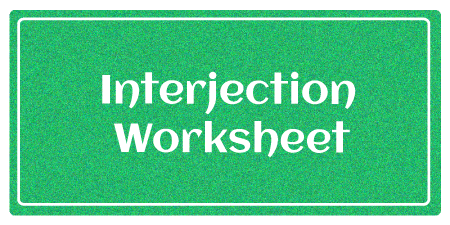Interjection WorksheetOne of the eight parts of speech is interjections. The other seven parts of speech include noun, pronoun, verb, preposition, adjective, adverb, and conjunction. Interjections are employed in sentences to express emotion. While they are not commonly used in academic writing, they do have a place in other writing genres, such as short fiction. This interjection worksheet will provide an opportunity for students to practice utilizing interjections in statements. 
Review of InterjectionsInterjections are frequently used at the start of a statement. They can, however, occur anywhere else in the statement, along with the middle and end. Based on the depth of the emotions the writer wishes to communicate, interjections are typically accompanied by a comma or an exclamation mark. Sometimes writers would use many exclamation marks to add more intensity to their text. To be honest, only one exclamation point is required to communicate emotion. Interjection ExamplesHere are some examples of statements with the interjection highlighted:
Since interjections have no relationship to the rest of the sentence, they are only useful in quotations, like a conversation between characters in a story, or in informal writing, like as messaging, writing, or emailing relatives and friends. Incorporate or academic writing, where the style must be professional, interjections are seldom, if ever, used. Onomatopoeia as InterjectionsAnother interesting characteristic about interjections is that they are frequently onomatopoeic. Onomatopoeia is a term that sounds like "woot," "doh," or "boo." These terms can be found in any language; nevertheless, the very same sound in multiple languages will match the characteristics of that language. Interjections in other nations vary according to culture and language. Interjection Worksheet - APart A: Identify the InterjectionRecognize the interjection in the below-mentioned sentences and highlight them.
Answers for Interjection Worksheet- A
Part B: Select the Appropriate InterjectionGuidelines: Select the most suitable interjection from the list below and start writing it in the space given in the below-mentioned sentences. 1. _________,Where have you been these days ? 2. ________, I am very glad that you came to meet us . 3. _______________,it's not very often that you are seeing a dog trying to ride a hoverboard . 4. ________, how can you even say yes to such a proposal ? 5. _________, I forgot to get my dairy . 6. _______, this is the perfect proposal, thanks . 7. __________ this is a very big kitty at the ending of the leash . 8. ___________That is a very beautiful outfit . 9 .__________my favourite actor is going to visit our college next week . 10. This is my new bike,_____ ! Answers to interjection worksheet - Part BCertainly, the answers to the sentences can differ. Many of the options can be combined into multiple sentences. You might say, "Seriously," or I might say, "Yikes." Some might suggest, "Hooray," and I'd say, "Omg." However, we have given the following answers and the reasons.
Interject Life with JoyLike many aspects of the English language, interjections are intended to be used sparsely. They're truly effective in small bits of dialogue if you are trying to write a small story.
Next TopicTypes of Interjection
|
 For Videos Join Our Youtube Channel: Join Now
For Videos Join Our Youtube Channel: Join Now
Feedback
- Send your Feedback to [email protected]
Help Others, Please Share










